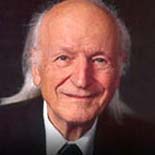 James Dillet Freeman (March 20, 1912 – April 9, 2003) was a poet and a minister of the Unity Church, a New Thought denomination. Freeman was born Abraham Freedman according to his Delaware Birth Certificate in Wilmington, Delaware but began using the name James very early. His father was Jacob Freedman, who was Jewish and emigrated from Eastern Europe in 1896. James’ mother was Sarah Esther Elberson, who was born in New Jersey, 1890. In the mid 1920s Sarah, James and his sister Rose moved to Kansas City, MO, where James eventually went to work at the Unity School as a clerk. It was sometime after 1958 that James began using the pen name, James Dillet Freeman.
James Dillet Freeman (March 20, 1912 – April 9, 2003) was a poet and a minister of the Unity Church, a New Thought denomination. Freeman was born Abraham Freedman according to his Delaware Birth Certificate in Wilmington, Delaware but began using the name James very early. His father was Jacob Freedman, who was Jewish and emigrated from Eastern Europe in 1896. James’ mother was Sarah Esther Elberson, who was born in New Jersey, 1890. In the mid 1920s Sarah, James and his sister Rose moved to Kansas City, MO, where James eventually went to work at the Unity School as a clerk. It was sometime after 1958 that James began using the pen name, James Dillet Freeman.
Freeman was sometimes referred to as the “poet laureate to the moon” because his poems were twice brought to the moon, “a distinction he shares with no other author.” His 1941 “Prayer for Protection” was taken aboard Apollo 11 in July 1969 by Lunar Module pilot Buzz Aldrin, and a microfilm of Freeman’s 1947 “I Am There” was left on the moon by James B. Irwin on Apollo 15. Freeman received the inspiration to write ‘I Am There’ during the death of his first wife Katherine.
Freeman’s poems include “Blessings for a Marriage” and “The Traveller.” The latter poem was written after one of Freeman’s friends had died.
While James Dillet Freeman worked for Silent Unity and was a writer for the Unity magazine called Daily Word for most of his adult life, he proudly proclaimed on many occasions that he had never joined Unity, revelling in his independent nature and personifying a spirit present throughout Unity and the New Thought Movement. Freeman became a millionaire from his prolific writings. Many of his poems and affirmations were sold to major card companies such as Hallmark.
FREEDOM WITHIN
James Dillet Freeman
How free the eagle who at height
Of heaven flings himself in flight,
But his high flights has first to start
Not in the sky, but in his heart.
Likewise with me, how shall I find
Freedom if not within my mind,
And learn, as thought by thought I try,
That I may fall, yet I can fly,
and even sometimes rise up free
Beyond the highest heights of me.
=====
ON WINGS OF SONG
James Dillet Freeman
The boughs hang bare when the winter winds blow
But the little birds sing in spite of snow.
I like to believe that I, a man,
Can do as well as a little bird can,
But you have to have faith in the rightness of things
To fling yourself out on feathers and wings,
And sing when there seems to be nothing there
But icy winds and empty air.
Little bird, fly up to the top of the tree of my mind,
And sing your song in me.